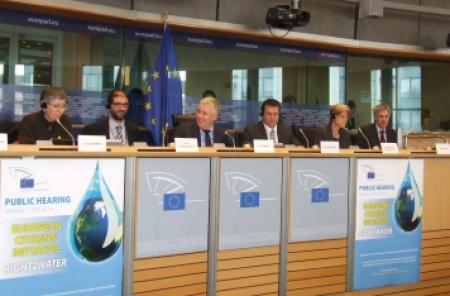Three years after the launch of the only direct democratic participation tool at EU level, the third initiative is entering its final stages. Following the initiatives ‘Right2Water’ (defending water as a human right) and ‘One of Us’ (opposing abortion), ‘Stop Vivisection’ was an Italian-based pan-European campaign launched by citizens, proposing a new EU law that would put an end to animal testing.
The campaign managed to collect more than 1,150,000 signatures from people right across Europe. On 11 May the organisers were invited to a public hearing at the European Parliament to discuss their cause.
The Parliament saw a highly controversial debate regarding the issue, with members from the Parliament’s committees on agriculture, environment, petitions and industry and research defending greatly diverse opinions. Some positioned themselves in favour of the initiative, arguing that animal welfare is a European value; that as much as 80% of the population supports animal protection in biomedical research; and that, instead, alternative approaches must be found to replace the 11.5 million experiments performed every year on animals.
On the contrary, other MEPs vehemently rejected the ECI, claiming that animal testing is crucial for the advancement of medical research and for the protection against severe diseases. Only last week, a group of scientist and biomedical research organisations mobilised a campaign against "Stop Vivisection", claiming that animal research is indispensable for ensuring human safety.

Although not all participants at the public hearing welcomed the demands made by "Stop Vivisection", the ECI has most certainly led to a vibrant debate regarding the issue. Hereby it accomplishes one of the core aims of the European Citizens’ Initiative: fostering transnational debates about transnational topics. With this in mind, it may be sensible to introduce such public hearings at earlier stages.
The European Parliament could invite the organisers of an ECI to a first hearing once it has gathered 100,000 signatures. This would give ongoing initiatives a political platform, greater visibility, and thus facilitate public debate on the issue. Of the 28 ECIs that were accepted and closed in the past three years, ten initiatives (including the three successful ECIs) would have had such a hearing.
Nonetheless, triggering debate is far from sufficient to declare an ECI as successful. The second core aim is to give citizens an agenda-setting right, which implies that initiatives must also be able to lead to real legislative change. Consequently, the European Commission has a responsibility to take each successful initiative’s request seriously and to respond in a robust, comprehensible and transparent manner; in the case of agreement the Commission should be obliged to come forward with a legislative proposal within one year at the latest.
Only this will ensure a serious initiative right for European citizens and truly make them co-legislators in Europe (on a par with the European Parliament and the European Council). Whether the ECI ‘Stop Vivisection’ will be successful or not is still too early to judge. This will be decided by the Commission’s concrete follow-up to the legislative initiative request.
2015 marks the year for an official review of the ECIive, which presents an opportunity to bring important improvements to the instrument. Taken at face value, the tool should go some way to countering the Euroscepticism and EU-fatigue that are spreading across the continent, but in practice the ECI is struggling to work. Many EU bodies (Parliament, Council, Ombudsman, Economic and Social Committee, Committee of the Regions) are currently positioning themselves on necessary reforms to improve the ECI. Civil society organisations have recently mobilised a call for action, ‘Make your voice heard in Europe!’, to build public pressure from below on the Commission to remove bureaucratic and political obstacles for the tool to thrive. So far, some 20,000 people have signed the call to action.
The future of a strong European democracy and the public’s acceptance of the EU depend very much on whether the European Citizens’ Initiative is politically taken seriously and undergoes meaningful reform. It will take sincere political will if the ECI is not to end up being a mere democratic façade before a crumbling relationship between the EU institutions and Europe’s citizens.
This opinion piece by Sophie von Hatzfeldt was published on Euractiv on 13 May 2015.
Read original OpEd on Euractiv here.

